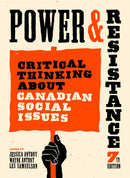Description
Power and Resistance debunks the dominant neoliberal, hyper-individualist approach to society’s problems that sees poverty as a result of laziness, environmental crises as a result of market demands for products that pollute, and Indigenous Peoples’ struggles as a result of not assimilating. We argue that it is social inequality and oppression that are the underlying causes of social problems. In a society like ours, powerful groups make choices that benefit them and force those choices onto others, creating life problems for others and society as a whole. The powerful also have influence over what is and is not called a “social problem.” Solving social problems requires changing the structures of inequality and oppression. For example, industrial corporate agriculture has created huge profits for a few gigantic food corporations but left much of the world hungry. But farmers and their allies are pushing back through agroecology — an agriculture based on local, small-scale, ecologically sustainable farming that brings eaters and growers closer to one another. The seventh edition of Power and Resistance includes new chapters on anti-Black racism in schools, Indigenous people and mental health, food security and sovereignty, and work in the gig economy by multiple authors and perspectives represented in the 14 chapters including a chapter by Pam Palmater, a Mi’kmaw citizen and member of the Eel River Bar First Nation in northern New Brunswick.


